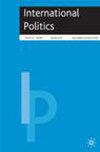IR中的种族:走向实证研究
IF 0.9
Q2 INTERNATIONAL RELATIONS
引用次数: 0
摘要
埃罗尔·亨德森写道:“白人至上主义的平庸,比民主和平理论更可能是世界政治中最接近经验法则的东西。”’”这种观点很可能被那些把种族作为同类等级制度来研究的IR学者们所认同。相比之下,集体领域现在“注意到”它在这个问题上的长期沉默。对主流种族的重新呼吁伴随着一个令人不安的承认:“反对注意的规范”不是错误的,而是一种对一系列直觉的认知上的忠诚,这些直觉排除了全球多数人的作用。在我们的沉默中——无意或无意——我们放弃了对结果的更准确的描述,在这些结果中,种族在理论上是重要的,甚至像亨德森解读的那样是平庸的。他的贡献清楚地表明,我们能够而且应该改变方向。我对亨德森的回应旨在加强对世界政治中种族问题的积极态度的论证——包括它的承诺和挑战。本文章由计算机程序翻译,如有差异,请以英文原文为准。
Race in IR: toward empirical study
Abstract Errol Henderson writes “the banality of white supremacy, more than the democratic peace thesis, is probably ‘the closest thing to an empirical law in world politics.’” Such a view is likely shared by IR scholars that study race as kindred systems of hierarchy. By comparison, the collective field is now “noticing” its long silence on the subject. Renewed calls to mainstream race have come with an unsettling admission: the “norm against noticing” was not by mistake but an epistemic devotion to a set of intuitions that exclude the agency of a global majority. In our silence—inadvertent or otherwise—we forgo a more accurate account of outcomes where race is theoretically important or even banal as Henderson deciphers. What is made clear by his contribution is that we can and should change course. My response to Henderson seeks to reinforce the argument for a positivist approach to race in world politics—both its promises and challenges.
求助全文
通过发布文献求助,成功后即可免费获取论文全文。
去求助
来源期刊
CiteScore
3.10
自引率
7.10%
发文量
47
期刊介绍:
International Politics?is a leading peer reviewed journal dedicated to transnational issues and global problems. It subscribes to no political or methodological identity and welcomes any appropriate contributions designed to communicate findings and enhance dialogue.International Politics?defines itself as critical in character truly international in scope and totally engaged with the central issues facing the world today. Taking as its point of departure the simple but essential notion that no one approach has all the answers it aims to provide a global forum for a rapidly expanding community of scholars from across the range of academic disciplines.International Politics?aims to encourage debate controversy and reflection. Topics addressed within the journal include:Rethinking the Clash of CivilizationsMyths of WestphaliaHolocaust and ChinaLeo Strauss and the Cold WarJustin Rosenberg and Globalisation TheoryPutin and the WestThe USA Post-BushCan China Rise Peacefully Just WarsCuba Castro and AfterGramsci and IRIs America in Decline。

 求助内容:
求助内容: 应助结果提醒方式:
应助结果提醒方式:


